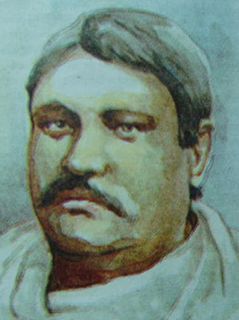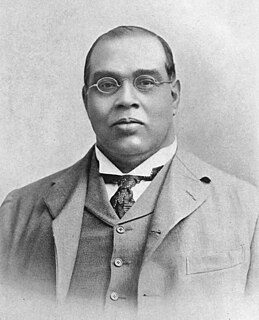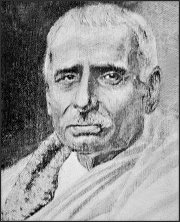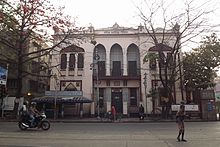
Akshay Kumar Maitreya was a noted Indian historian and social worker from Bengal. He was born in Nadia to Mathuranath Maitreya. Much of his education was in Kolkata and Rajshahi. He passed his B.L. examination from Rajshahi College. He was a friend of Rabindranath Tagore, but famously engaged with him in an argument about whether history based fiction should necessarily represent historical facts correctly. Maitreya, being a historian, called for historical correctitude, while Tagore declared that an artist has freedom to bend historical facts.
Chandidas was a medieval poet of Bengal, or possibly more than one. Over 1250 poems related to the love of Radha and Krishna in Bengali with the bhanita of Chandidas are found with three different sobriquets along with his name, Baḍu, Dvija and Dina as well as without any sobriquet also. It is not clear whether these bhanitas actually refer to the same person or not. It is assumed by some modern scholars that the poems which are current in the name of Chandidas are actually the works of at least four different Chandidas, who are distinguished from each other by their sobriquets found in the bhanitas. It is also assumed that the earliest of them was Ananta Baḍu Chandidas, who has been more or less identified as a historical figure born in the 14th century in Birbhum district of the present-day West Bengal state and wrote the lyrical Srikrishna Kirtan.

Paschimbanga Bangla Akademi is the official regulatory body of the Bengali language in West Bengal, India. Modeled after Bangla Academy of Bangladesh and France’s Académie française, the Bangla Akademi was founded on May 20, 1986 in Kolkata to act as the official authority of the language and is entrusted with the responsibility of reforming Bengali spelling and grammar, compiling dictionaries, encyclopedias and terminologies and promoting Bengali language and culture in West Bengal. Though the Akademi has no enforcement power over their rules and regulations, yet they are widely accepted by the Governments of West Bengal and Tripura as well as a considerable number of private publishing houses and institutions like the Oxford University Press and the Ramakrishna Mission.

Tarasankar Bandyopadhyay was an Indian novelist who wrote in the Bengali language. He wrote 65 novels, 53-story-books, 12 plays, 4 essay-books, 4 autobiographies, 2 travel stories and composed several songs. He was awarded Rabindra Puraskar, Sahitya Akademi Award, Jnanpith Award, Padma Shri and Padma Bhushan.

Kamini Roy was a Bengali poet, social worker and feminist in British India. She was the first woman honours graduate in British India.

Ramendra Sundar Tribedi was a renowned Bengali author. He is known for his works in Bengali poems, and stories. He is one of the most popular poets of India.

Abdul Karim, known as Abdul Karim Sahitya Bisharad, was a Bengali littérateur, historian of Bangla literature and collector and interpreter of old Bangla manuscripts.

Rajnarayan Basu (1826–1899) was an Indian writer and intellectual of the Bengal Renaissance. He was born in Boral in 24 Parganas and studied at the Hare School and Hindu College, in Kolkata, Bengal. A monotheist at heart, Rajnarayan Basu converted to Brahmoism at the age of twenty. After retiring, he was given the honorary title of Rishi or sage. As a writer, he was one of the best known prose writers in Bengali in the nineteenth century, writing often for the Tattwabodhini Patrika, a premier Brahmo journal. Due to his defence of Brahmoism, he was given the title "Grandfather of Indian Nationalism"

Romesh Chunder Dutt was an Indian civil servant, economic historian, writer and translator of Ramayana and Mahabharata. Dutt is considered a national leader of the pre-Gandhian era, and was a contemporary of Dadabhai Naoroji and Justice Ranade.

Hara Prasad Shastri, also known as Hara Prasad Bhattacharya, was an Indian academic, Sanskrit scholar, archivist and historian of Bengali literature. He is most known for discovering the Charyapada, the earliest known examples of Bengali literature.
Sarat Kumar Ray (1876–1946) was a member of the royal family of Dighapatia. A noted scholar, he was the son of the Raja (King) Pramathanath Ray and lived in the Maharaja's Palace. Along with historian Ramaprasad Chanda, he co-founded the Varendra Research Museum, which Lord Dundas the Governor of Bengal, inaugurated in November 1919. He was well traveled, and visited England in 1900. He was a friend of Rabindranath Tagore.
Jogesh Chandra Bagal was an Indian journalist, historian and writer.

Bengali Muslims are adherents of Islam who ethnically, linguistically and genealogically identify as Bengalis. They are the second largest Muslim ethnic group in the world and the largest among the Indo-Europeans. Bengali Muslims make up the majority of Bangladesh's citizens, and are the largest minority in the Indian states of West Bengal, Assam and Tripura. They speak or identify the Bengali language as their mother tongue. The majority of Bengali Muslims are Sunnis who follow the Hanafi school of jurisprudence.

Nagendranath Basu was an archaeologist, encyclopaedist and a nationalist social historian of Bengal.
Sushil Kumar De was a Bengali polymath from the early decades of the 20th century. Trained as a lawyer, with degrees in English and Sanskrit Poetics, he wrote extensively on Sanskrit Literature, Philosophy, Poetics, History of Bengali Literature, besides editing critical editions for a large number of Sanskrit and Bengali texts from manuscripts.

Bengal is a region in South Asia, politically split between Bangladesh and India. Due to its long history and complicated political divisions, various names have been used to refer to the region and its subsections. The modern English name Bengal is an exonym derived from the Bengal Sultanate period. The name is used by both Bangladesh and West Bengal in international contexts. In the Bengali language, the two Bengals each use a different term to refer to the nominally identified nation: Bānglā (বাংলা) and Baṅga (বঙ্গ)

Khudiram Das was an Indian scholar, educationist, critic, litterateur, an authority on Rabindra literature and linguistic expert.
Sajanikanta Das was a Bengali poet, literary critic and editor of Shanibarer Chithi.
Bangiya Mussalman Sahitya Samiti is a historic Bengali literary society that was founded in 1911 and was associated some of most well known literary figures of that era.
Mohammad Rowshan Ali Chowdhury was a Bengali journalist, writer, poet and politician.














